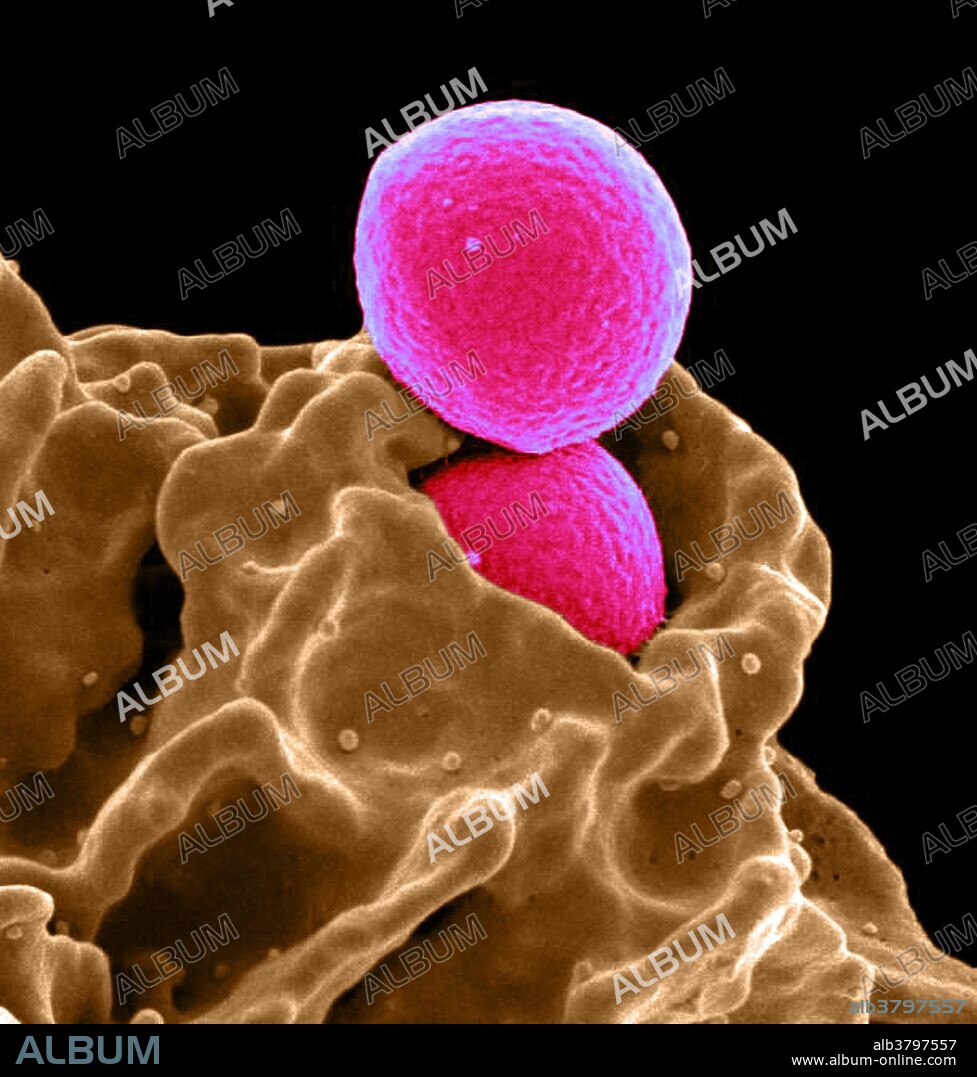alb3797557
Neutrophil Ingesting MRSA bacteria, SEM

|
Add to another lightbox |
|
Add to another lightbox |



Title:
Neutrophil Ingesting MRSA bacteria, SEM
Caption:
Color enhanced scanning electron micrograph of MRSA bacteria being ingested by a neutrophil. Methicillin-resistant Staphylococcus aureus (MRSA) is a bacterium responsible for several difficult-to-treat infections in humans. It is also called multidrug-resistant Staphylococcus aureus and oxacillin-resistant Staphylococcus aureus (ORSA). MRSA is any strain of Staphylococcus aureus that has developed resistance to beta-lactam antibiotics, which include penicillins and cephalosporins. Strains unable to resist these antibiotics are classified as methicillin-sensitive Staphylococcus aureus, or MSSA. The development of such resistance does not cause the organism to be more intrinsically virulent than strains of Staphylococcus aureus that have no antibiotic resistance, but resistance does make MRSA infection more difficult to treat with standard types of antibiotics and thus more dangerous. MRSA is especially troublesome in hospitals and nursing homes, where patients with open wounds, invasive devices, and weakened immune systems are at greater risk of infection than the general public.
Credit:
Album / Science Source
Releases:
Model: No - Property: No
Rights questions?
Rights questions?
Image size:
3150 x 3300 px | 29.7 MB
Print size:
26.7 x 27.9 cm | 10.5 x 11.0 in (300 dpi)
Keywords:
BACTERIA • BACTERIAL • BACTERIOLOGY • BACTERIUM • BETA-LACTAM ANTIBIOTICS • BLOOD CELL • BLOOD VESSEL • BLOOD • COLORIZED • DRUG RESISTANT • DRUG-RESISTANT • ELECTRON MICROGRAPH • ELECTRON MICROSCOPY • EM • ENHANCEMENT • GRAM + • GRAM POSITIVE • GRAM+ • GRAM-POSITIVE • GRANULOCYTES • HISTOPATHOLOGICAL • HISTOPATHOLOGY • INFECTIOUS AGENT • INGEST • INGESTING • INGESTION • METHICILLIN RESISTANT • METHICILLIN-RESISTANT BACTERIA • METHICILLIN-RESISTANT STAPHYLOCOCCUS AUREUS • METHICILLIN-RESISTANT • MICROBIOLOGY • MICROGRAPH • MICROORGANISM • MICROSCOPIC ORGANISM • MICROSCOPIC • MICROSCOPY • MONAD • MRSA • MULTIDRUG-RESISTANT STAPHYLOCOCCUS AUREUS • NEUTROCYTES • NEUTROPHIL GRANULOCYTES • NEUTROPHILS • ORSA • OXACILLIN-RESISTANT STAPHYLOCOCCUS AUREUS • PATHOGEN • PATHOGENIC SPECIES • PATHOGENIC • PROKARYOTE • PROTOZOA • S. AUREUS • SANGUINE • SCANNING ELECTRON MICROGRAPH • SCANNING ELECTRON MICROSCOPE • SCANNING ELECTRON MICROSCOPY • SCIENCE • SEM • SINGLE-CELLED ORGANISM • STAPH INFECTION • STAPH • STAPHYLOCOCCUS AUREUS • STAPHYLOCOCCUS • UNICELLULAR ORGANISM • WBC • WHITE BLOOD CELL • WHITE CELL
 Pinterest
Pinterest Twitter
Twitter Facebook
Facebook Copy link
Copy link Email
Email

